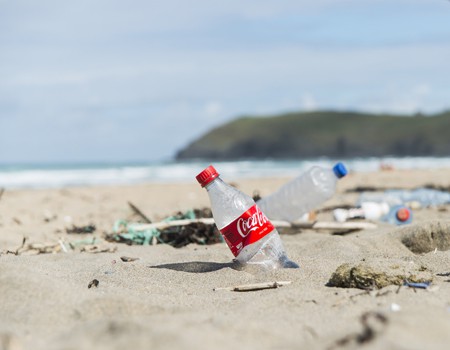Waste management firm Suez UK was praised today (28 March) by the Campaign for Protection of Rural England for supporting a deposit return system for the UK. But, the waste company, following publication of new research, has clarified its position and said it prefers an ‘on the go’ DRS solution which is opposed by CPRE.

Debate is centring on what types of bottles should be covered by the DRS
The difference between the two approaches is seen, for example, as the ‘on the go’ solution covering small drinks bottles and cans, while large bottles of lemonade, for example, wouldn’t be covered under ‘on the go’. This approach is also seen as likely to have less impact on kerbside collections.
The CPRE charity has been one of the strongest and influential of lobbyists on the introduction of a full deposit scheme, winning the attention of former prime minister David Cameron and now, environment secretary Michael Gove.
Explaining its case today for a full DRS scheme, the CPRE charity chose to highlight Suez’ support for DRS, stating: “Suez UK – part of a major global waste giant – came out in favour of a deposit return system, saying that it would be a ‘win win’ for the environment and the economy”.
Comprehensive
Howwever, CPRE confirmed to letsrecycle.com that it is opposed to the idea of DRS limited to covering ‘on the go’ containers.
A spokesperson explained: “We want to see a comprehensive system that would include every single type of container possible and we would also like to see all materials covered. If it is the case that there are supporters of an ‘on the go’ approach, then we would be opposed to this.”
And, CPRE also reaffirmed the findings a report, by Eunomia, published last year which claimed there would be net savings to councils under a full DRS of £35 million. The report said that local authorities (and their contractors) would handle less material and lose income because of the reduced number of cans and plastic bottles in kerbside collections.
The issue of whether the deposit scheme should be limited to ‘on the go’ drinks containers to avoid disrupting existing collection routes is fast becoming a central issue in the wake of the government’s DRS announcement. Already, the LARAC local authority group chair, Carole Taylor, has warned that kerbside schemes could be “cannibalised”.
Targeted
In a statement, Suez highlighted the findings of a report which it has commissioned which suggests “the most effective deposit return scheme (DRS) for Britain should only target on-the-go sized plastic bottles and aluminium cans to yield the best returns; have the maximum impact on litter prevention; and not risk undermining existing collection schemes.”

David Palmer-Jones, chief executive of Suez in the UK, is supporting the idea of a deposit scheme focused at the ‘on the go’ market channel
A spokesman for Suez UK explained that the research, commissioned from consultancy, Oakdene Hollins for the company, “looked at the best systems around the world and helped us hone our position and come to a conclusion that a DRS scheme would be most effective for ‘on the go’ containers.” It is called: How a deposit return scheme for ‘on the go’ could be designed for the UK .
Modelling
Modelling used in the company’s research put the likely “cannibalisation” rate of local authority kerbside collections at between 17-25%. Oakdene Hollins’ assessment suggests 8.8 billion plastic bottles and 9.7 billion aluminium cans are sold in the UK every year and that the “on-the-go” sizes account for 1.3 and up to 4.4 billion of those respectively. The current recycling rate for PET plastic bottles is 57 per cent and 70 per cent for aluminium cans. This, the consultant estimated, means that, in the case of plastic bottles alone, 171,000 tonnes of PET is currently placed in the market but not recycled each year.
The report concludes that a DRS scheme has the potential to increase recycling rates to more than 80% for both plastic bottles and aluminium cans, and that the overall value of deposits in the scheme could be over £1 billion between the two materials.
In a foreword to the research, Suez UK chief executive, David Palmer Jones, writes of how recycling and waste management performance has changed “beyond all recognition in the last 10 to 15 years. Huge success has been achieved in driving up recycling and driving down waste to landfill. All of this has been done with limited policy intervention whilst providing a very effective and cost efficient system.”
Mr Palmer-Jones explains how recycling rates have plateaued and to deliver more change, along with other measures, waste production needs tackling at source.
One of these key new tools, he says, will be a deposit return scheme delivered under the “principles of extended producer responsibility and targeting key packaging used in the ‘on the go’ environment.”
Profits
For its part, CPRE said today that the only real opponents of DRS left “are packaging companies, their trade associations and some companies that are well-paid to manage business-level recycling schemes. This is understandable, as of course they don’t want to lose income, but there’s no reason why the environment should pay to keep their profits up.”
A CPRE spokesperson explained that the reference to “companies and business-level recycling schemes” is a reference to compliance schemes operating under the PRN, packaging waste system.
The post Gulf opens between Suez and CPRE over deposit scheme appeared first on letsrecycle.com.
Source: letsrecycle.com Plastic


